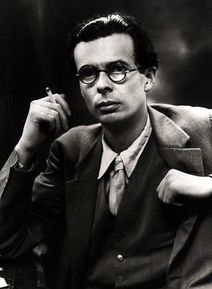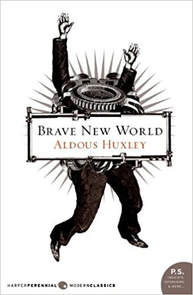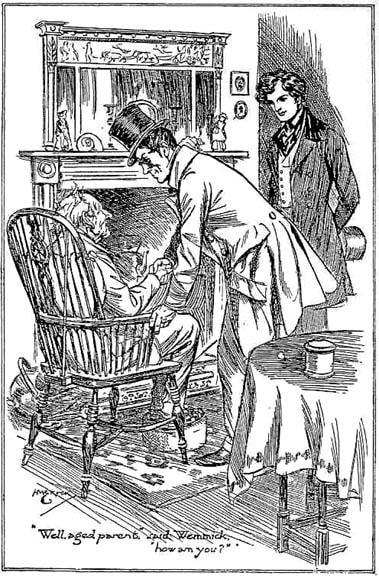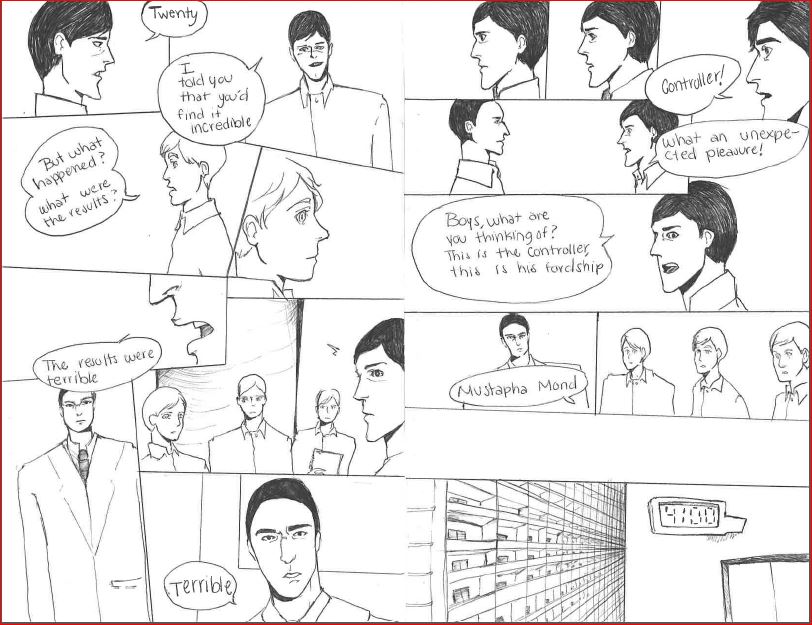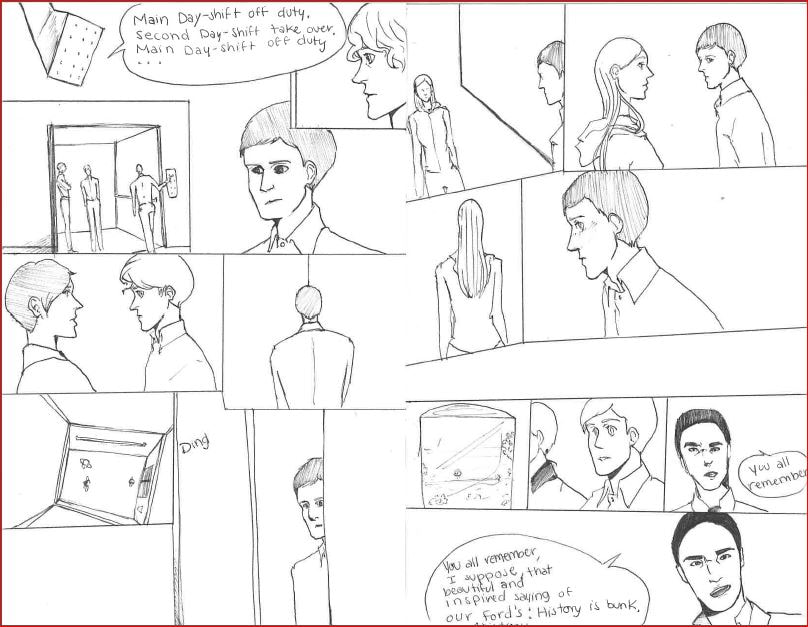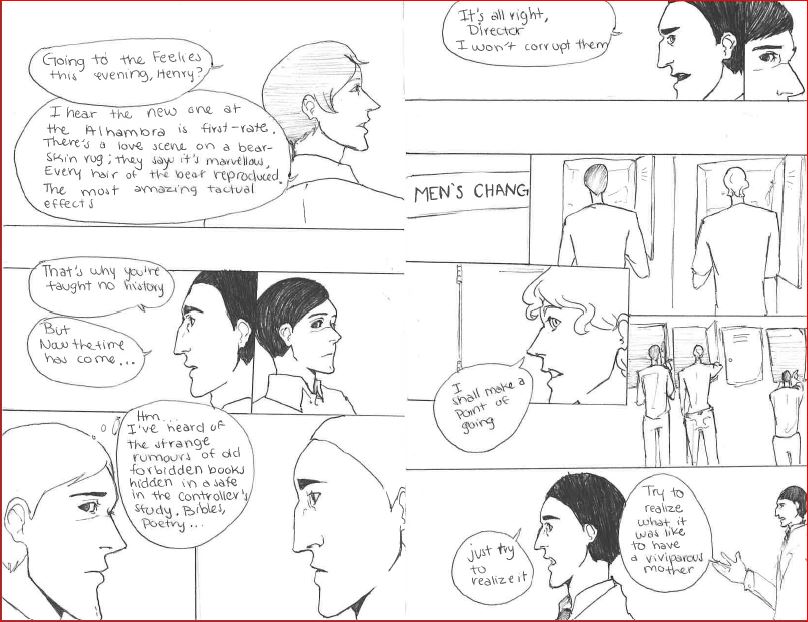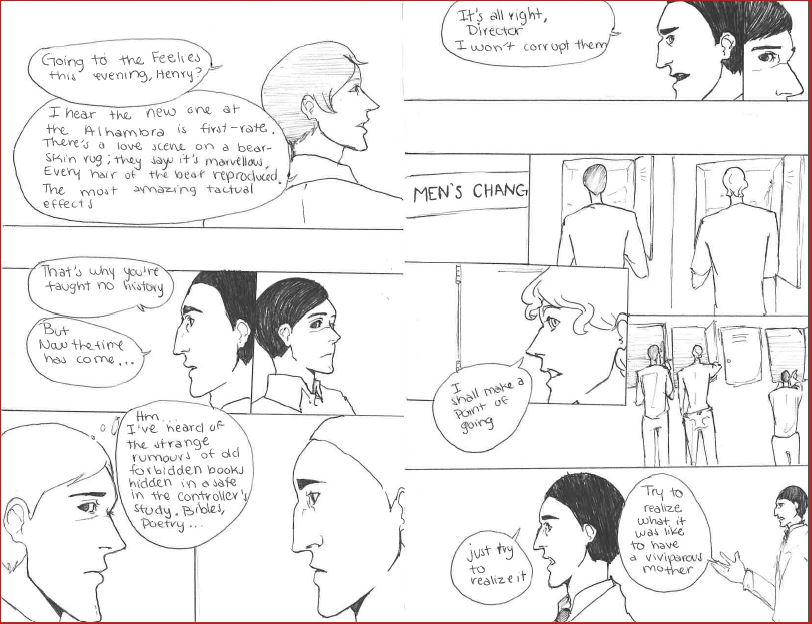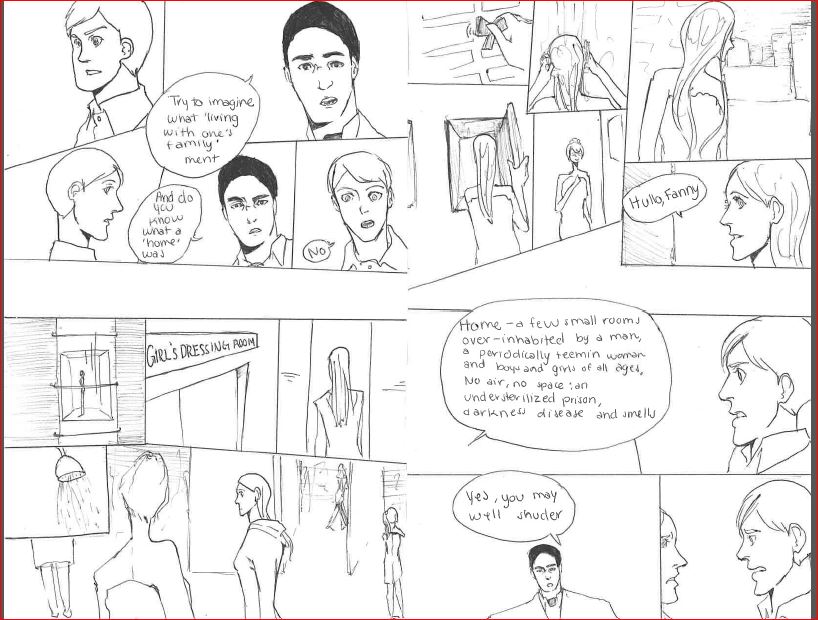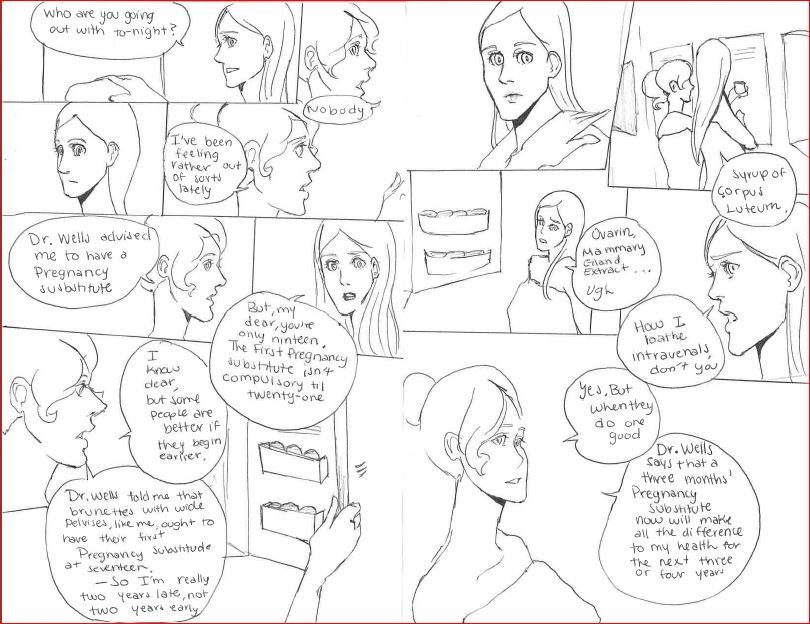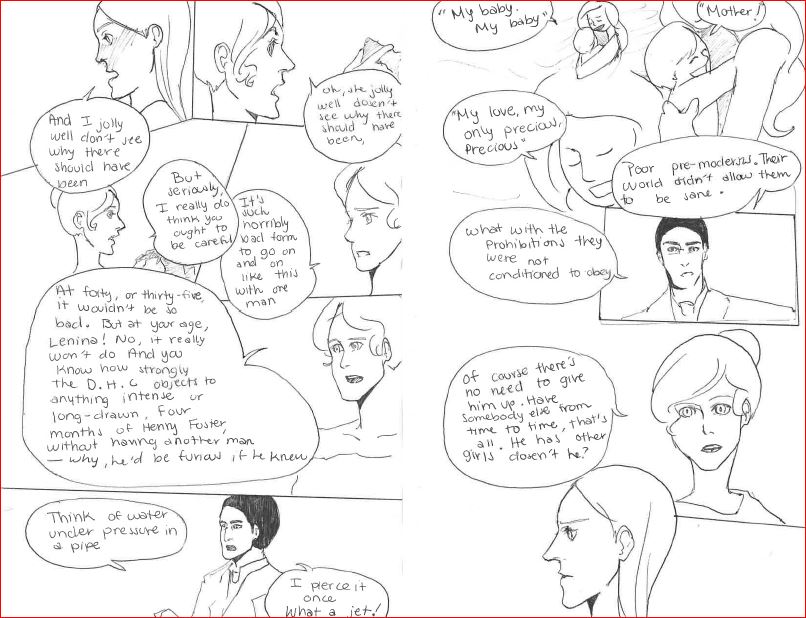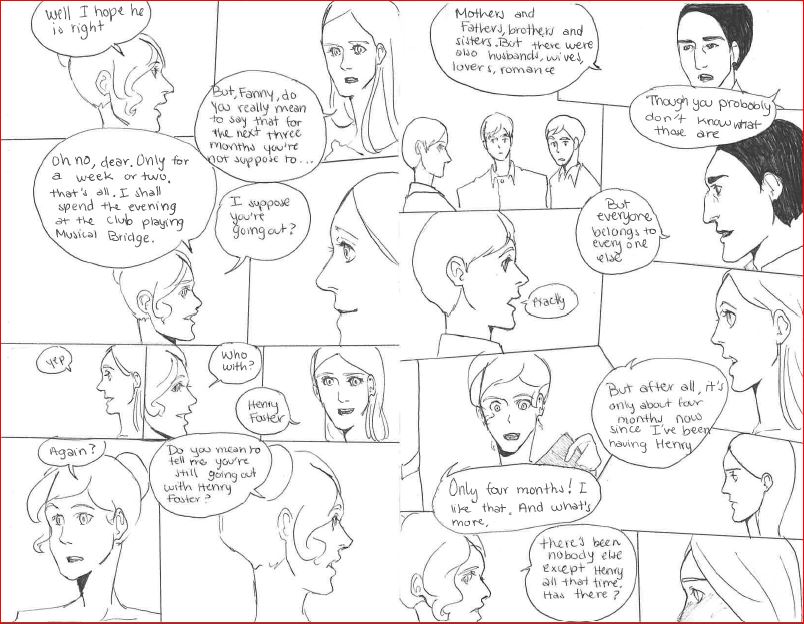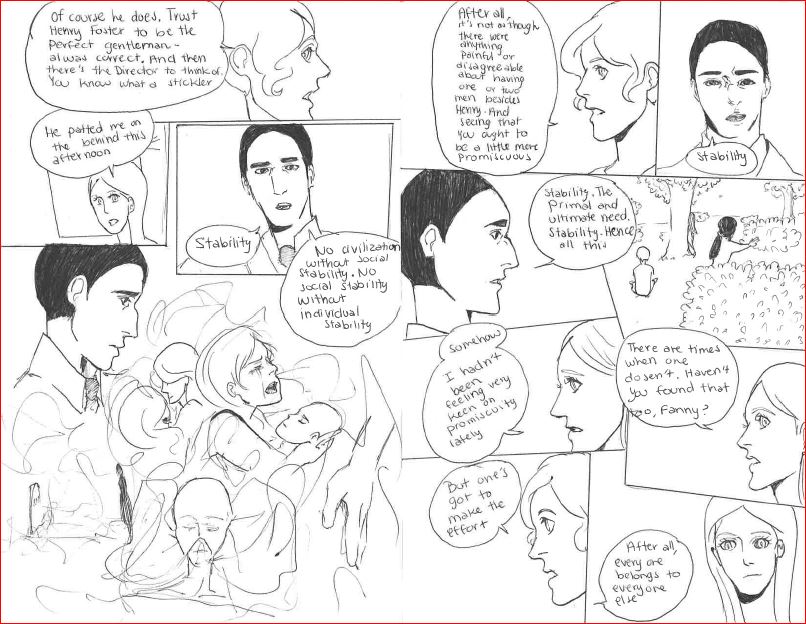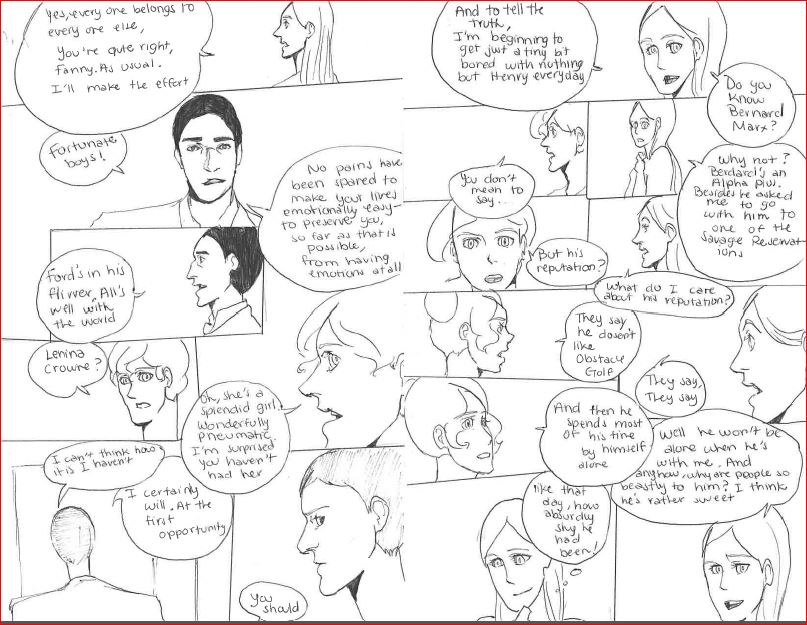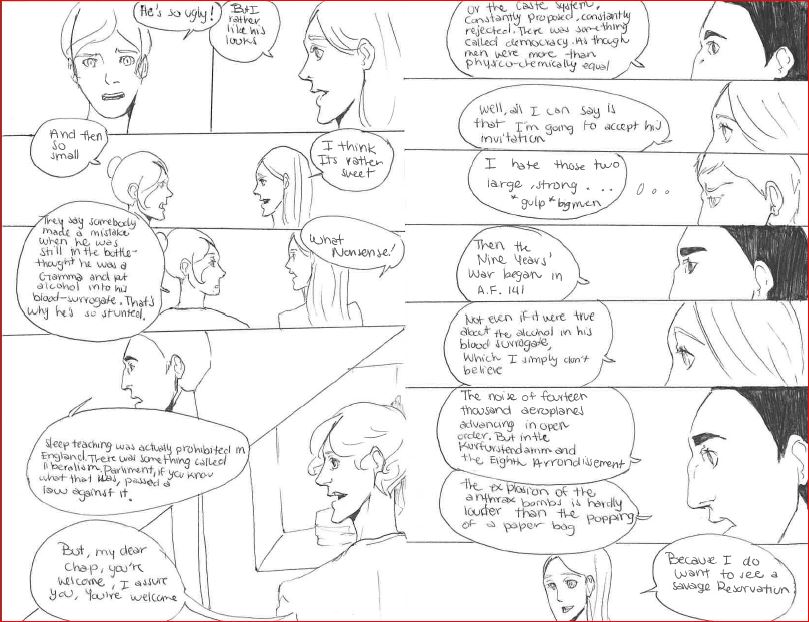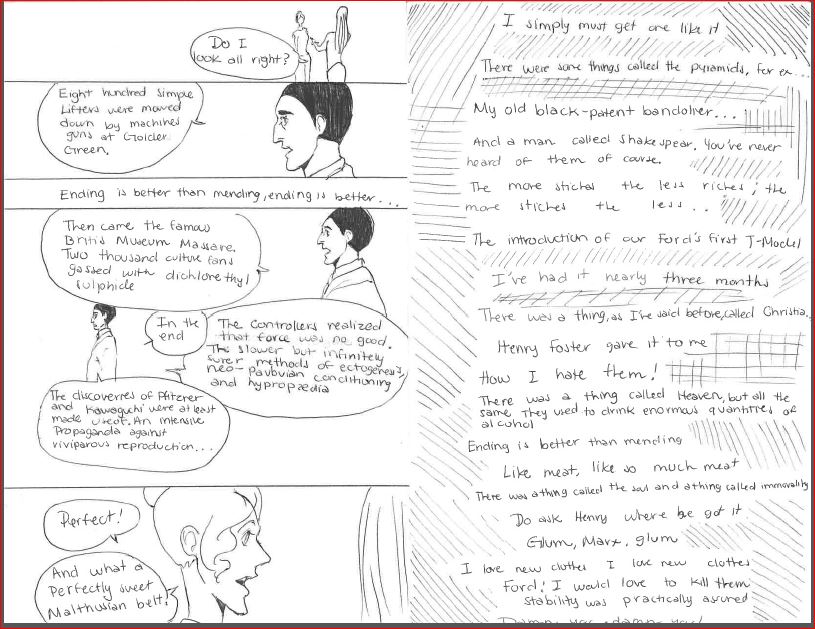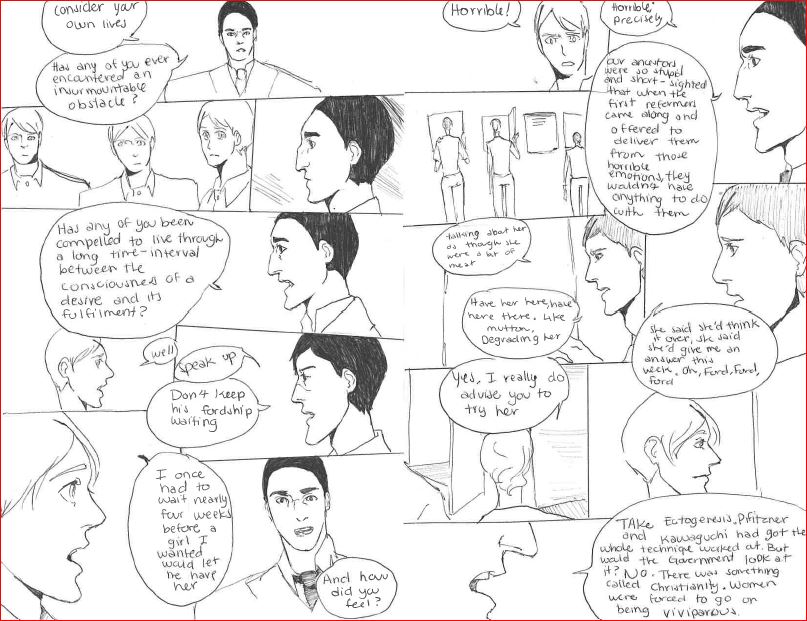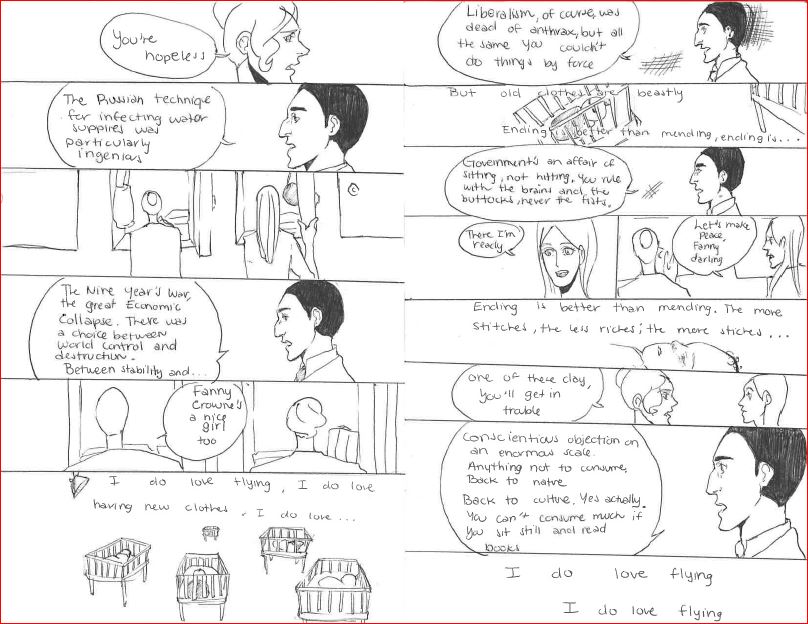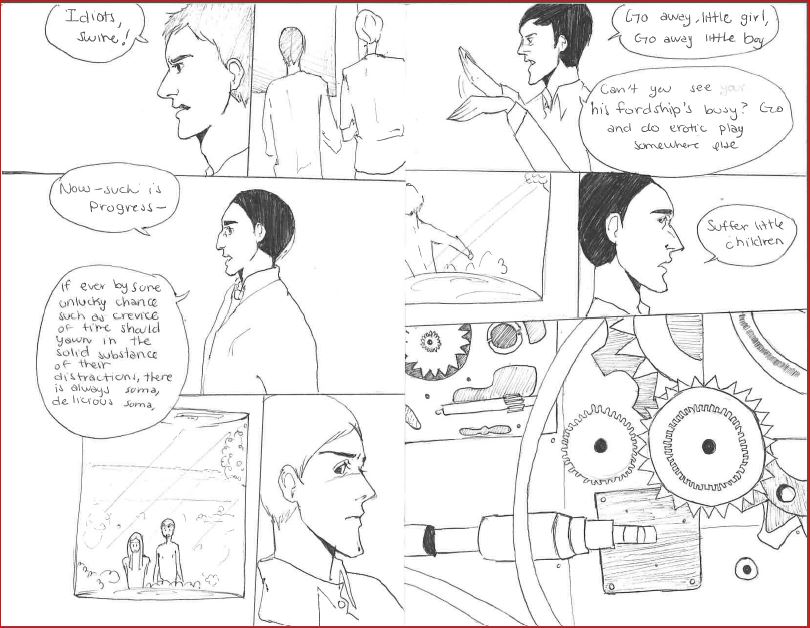Welcome to the “brave” new world of 2540 A.D. (632 A.F.). Now we are to embark on a wondrous journey through the World State. Here sarcasm, biting wit, inversed lexicon, pseudo-scientific mumbo jumbos—oh, I almost forgot, lots of Shakespeare and sex thrown into the mix—will overwhelm and disorient you. Have fun in the Huxleyan wonderland!
| pseudo-scientic_idiolect_in_brave_new_world.docx | |
| File Size: | 17 kb |
| File Type: | docx |
Socratic Questions:
Chapters 1-3
1. Upholding its motto, “Community, Identity, Stability,” the World State has perfected the processes of human reproduction and brainwashing as efficient and impersonal as possible. Illustrate either the process of decanting or conditioning; afterwards, provide your evaluation of such a community: is it utopian or dystopian community?
2. Religion, along with other forms of cultural and literary legacies, is jettisoned in the World State, and now it is ruled by World Controllers, conditioning, and soma. What kind of social or linguistic role do you think “Ford” plays in this futuristic society?
3. Lenina’s name evokes her society’s affinity to communism (Vladimir Ilrich Lenin was the leader of the Russian Revolution). On the other hand, such hierarchical distinctions as Alphas, Betas, Gammas, Deltas, and Epsilons smack of the Indian caste system. In what ways does this society resemble its historical antecedent—may that be communism, feudalism, or capitalism among others? Present your analysis by incorporating at least three textual references.
4. Why does the Ford—or the Freud—launch all-out attack on family values and the institution of family?
5. The first test-tube baby was born in 1978 and Dolly, the first cloned animal, was “born” in 1996, yet it was Huxley—not a scientist, mind you—that envisioned in vitro fertilization and artificial insemination already in 1932. In the Huxleyan world, bokanovskification serves to provide the World State with the well-controlled labor force. How is “bokanovskification” different from what we know about cloning?
6. Chapter 3 is very long and disorienting. What purpose do you think such a “dissociative” writing style serves? (Dissociation is a psychological term denoting the split of specific mental processes from the main body of consciousness).
Chapters 4-7
1. Even though Lenina is repulsed by Linda’s physical condition and lack of hygiene, there are many similarities between Lenina and Linda. Draw the similarities and differences between these two female characters.
2. The appalling rite of passage Palowhtiwa (the Indian boy who was flogged and bled) went through seems barbaric and senseless (in more than two senses). Nonetheless, John the blonde Savage envies the plights that tormented the native boy. What are the personal or cultural significance of this ritual in John’s distorted mind?
3. Characterize the friendship or bond between Helmholtz and Bernard. What brings these two vastly different men together?
4. The first part of Chapter 5 conveys a description of the Slough Crematorium. Explain how the World State justifies the cremation of the dead and the resultant harvesting of phosphorescence.
5. How does the operation of the Slough Crematorium presage Hitler’s implementation of the gas chamber
(granted that Hitler rose to power only in 1933 when he was elected as Chancellor)?
Chapter 8-12
1. Huxley hones his satirical flair (panache) against the resonating body of William Shakespeare's works. Develop your own analogy between the dyad of Linda-John and that of Prospero-Miranda of The Tempest.
2. The climactic effect the D.H.C. has intended devolves into a ridiculous farce in Chapter 10. Discuss the impact of Linda and John's arrival in the civilization.
3. Chapter 12 features a "poetry slam" between John (who recites scenes from Romeo and Juliet) and Helmholtz (who shares his rhyming exercise with his friends). In it, Helmholtz promotes solitude as a means of subversive defiance while, quite ironically, John has experienced solitude as a form of alienation and punishment throughout his life in the reservation. Also, Helmholtz ends up guffawing at the family struggles and cultural obstacles Romeo and Juliet faced in the Renaissance Verona. Illustrate the ironic effect of this poetry competition.
4. Locate an analogous example of the Huxleyan "feelies" in the twenty-first century setting and provide your comparison and contrast between them.
Chapters 13-18
1) What are Mustapha Mond’s arguments against freedom? Is there any validity to them?
2) If you had to choose either freedom or happiness as an absolute value, what would you choose and why?
3) In Chapter 13, Lenina and John are infatuated with each other; however, their language and social gestures alienate each other and violence and destruction ensue. It is obvious that Lenina's wooing gestures and romantic expectations are conditioned via hypnopedia. How about John? How do his own cultural precepts mentally condition John to behave in a particular way?
Chapters 1-3
1. Upholding its motto, “Community, Identity, Stability,” the World State has perfected the processes of human reproduction and brainwashing as efficient and impersonal as possible. Illustrate either the process of decanting or conditioning; afterwards, provide your evaluation of such a community: is it utopian or dystopian community?
2. Religion, along with other forms of cultural and literary legacies, is jettisoned in the World State, and now it is ruled by World Controllers, conditioning, and soma. What kind of social or linguistic role do you think “Ford” plays in this futuristic society?
3. Lenina’s name evokes her society’s affinity to communism (Vladimir Ilrich Lenin was the leader of the Russian Revolution). On the other hand, such hierarchical distinctions as Alphas, Betas, Gammas, Deltas, and Epsilons smack of the Indian caste system. In what ways does this society resemble its historical antecedent—may that be communism, feudalism, or capitalism among others? Present your analysis by incorporating at least three textual references.
4. Why does the Ford—or the Freud—launch all-out attack on family values and the institution of family?
5. The first test-tube baby was born in 1978 and Dolly, the first cloned animal, was “born” in 1996, yet it was Huxley—not a scientist, mind you—that envisioned in vitro fertilization and artificial insemination already in 1932. In the Huxleyan world, bokanovskification serves to provide the World State with the well-controlled labor force. How is “bokanovskification” different from what we know about cloning?
6. Chapter 3 is very long and disorienting. What purpose do you think such a “dissociative” writing style serves? (Dissociation is a psychological term denoting the split of specific mental processes from the main body of consciousness).
Chapters 4-7
1. Even though Lenina is repulsed by Linda’s physical condition and lack of hygiene, there are many similarities between Lenina and Linda. Draw the similarities and differences between these two female characters.
2. The appalling rite of passage Palowhtiwa (the Indian boy who was flogged and bled) went through seems barbaric and senseless (in more than two senses). Nonetheless, John the blonde Savage envies the plights that tormented the native boy. What are the personal or cultural significance of this ritual in John’s distorted mind?
3. Characterize the friendship or bond between Helmholtz and Bernard. What brings these two vastly different men together?
4. The first part of Chapter 5 conveys a description of the Slough Crematorium. Explain how the World State justifies the cremation of the dead and the resultant harvesting of phosphorescence.
5. How does the operation of the Slough Crematorium presage Hitler’s implementation of the gas chamber
(granted that Hitler rose to power only in 1933 when he was elected as Chancellor)?
Chapter 8-12
1. Huxley hones his satirical flair (panache) against the resonating body of William Shakespeare's works. Develop your own analogy between the dyad of Linda-John and that of Prospero-Miranda of The Tempest.
2. The climactic effect the D.H.C. has intended devolves into a ridiculous farce in Chapter 10. Discuss the impact of Linda and John's arrival in the civilization.
3. Chapter 12 features a "poetry slam" between John (who recites scenes from Romeo and Juliet) and Helmholtz (who shares his rhyming exercise with his friends). In it, Helmholtz promotes solitude as a means of subversive defiance while, quite ironically, John has experienced solitude as a form of alienation and punishment throughout his life in the reservation. Also, Helmholtz ends up guffawing at the family struggles and cultural obstacles Romeo and Juliet faced in the Renaissance Verona. Illustrate the ironic effect of this poetry competition.
4. Locate an analogous example of the Huxleyan "feelies" in the twenty-first century setting and provide your comparison and contrast between them.
Chapters 13-18
1) What are Mustapha Mond’s arguments against freedom? Is there any validity to them?
2) If you had to choose either freedom or happiness as an absolute value, what would you choose and why?
3) In Chapter 13, Lenina and John are infatuated with each other; however, their language and social gestures alienate each other and violence and destruction ensue. It is obvious that Lenina's wooing gestures and romantic expectations are conditioned via hypnopedia. How about John? How do his own cultural precepts mentally condition John to behave in a particular way?
A Graphic Novel based on Chapter 3 of Brave New World
by Angie Arcos
by Angie Arcos
